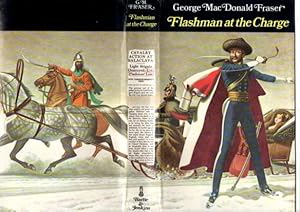


41), and Flash ruefully notes that "one of the difficulties of being a popular hero.

Flashman, because of his heroics in the first book, is seen by the British public and the establishment as 'the Hector of Afghanistan' (pg. And it is this quality which Flashman at the Charge returns to, as we begin in 1854 with Flashman trying to avoid being posted to the Crimea, where war with Russia is about to break out. You see, in the first book, the whole joke was that no matter how cowardly or selfish Flashman behaved, he always emerged to be (wrongly) thought of as a hero and upstanding gentleman. But the essential quality is that in these latter two books I've mentioned, Flashman is trying to keep up appearances, rather than, as in the other two books, operating under a pseudonym. Of course, Flashy needs no incentive to keep his head down, and both Flashman and Flashman at the Charge have him, at various points, in chains and/or at the mercy of some bloodthirsty savages or in some other sticky situation. In the second and third books, he was often in thrall to one force or another (Bismarck and his minions in Royal Flash, the slavers in Flash for Freedom!) and had to keep his head down.

This is in large part because, of the four books I have so far read, it is the one which is most similar to that uproariously entertaining debut.Īs much as I loved Royal Flash and Flash for Freedom!, the second and third books respectively, I often thought our lovable old Flashy was not able to cut loose as much as he was in his romps through India and Afghanistan in the first book and now, one can add, through Central Asia in the fourth book. 288).įlashman at the Charge, the fourth novel of the Flashman Papers, is perhaps the best in the series since the first, 1969's Flashman. Here I was again, with my essentials trapped in the mangle, and devil a thing to do but grin and bear it." (pg.


 0 kommentar(er)
0 kommentar(er)
